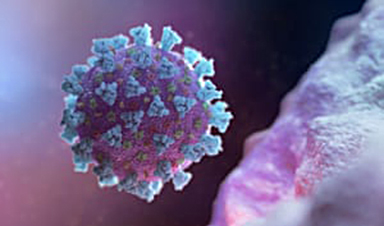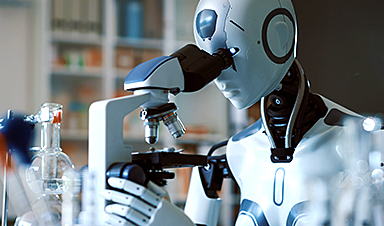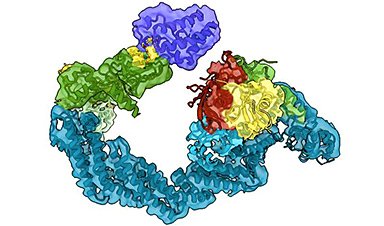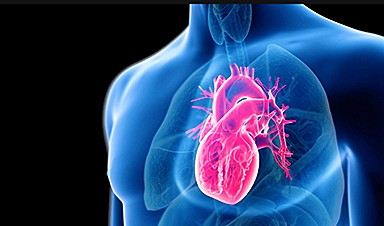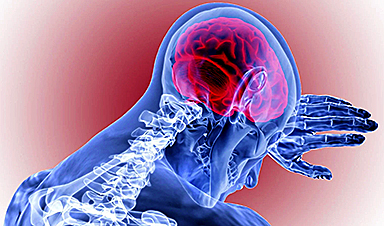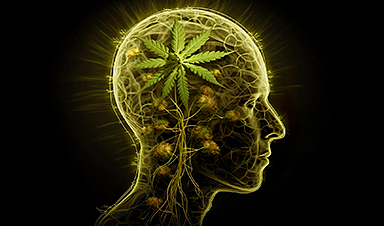Using post-mortem tissue samples, a team of researchers from Charité – Universitätsmedizin Berlin have studied the mechanisms by which the novel coronavirus can reach the brains of patients with COVID-19, and how the immune system responds to the virus once it does.
The results, which show that SARS-CoV-2 enters the brain via nerve cells in the olfactory mucosa, have been published in Nature Neuroscience.
For the first time, researchers have been able to produce electron microscope images of intact coronavirus particles inside the olfactory mucosa.
It is now recognized that COVID-19 is not a purely respiratory disease. In addition to affecting the lungs, SARS-CoV-2 can impact the cardiovascular system, the gastrointestinal tract and the central nervous system. More than one in three people with COVID-19 report neurological symptoms such as loss of, or change in, their sense of smell or taste, headaches, fatigue, dizziness, and nausea. In some patients, the disease can even result in stroke or other serious conditions.
Until now, researchers had suspected that these manifestations must be caused by the virus entering and infecting specific cells in the brain. But how does SARS-CoV-2 get there?
Under the joint leadership of Dr. Helena Radbruch of Charité’s Department of Neuropathology and the Department’s Director, Prof. Dr. Frank Heppner, a multidisciplinary team of researchers has now traced how the virus enters the central nervous system and subsequently invades the brain.
As part of this research, experts from the fields of neuropathology, pathology, forensic medicine, virology and clinical care studied tissue samples from 33 patients (average age 72) who had died at either Charité or the University Medical Center Göttingen after contracting COVID-19. Using the latest technology, the researchers analyzed samples taken from the deceased patients’ olfactory mucosa and from four different brain regions. Both the tissue samples and distinct cells were tested for SARS-CoV-2 genetic material and a ‘spike protein’ which is found on the surface of the virus.
Top Image Credit: Amanda Scott / Envato
Post by Amanda Scott, NA CEO. Follow her on twitter @tantriclens
Thanks to Heinz V. Hoenen. Follow him on twitter: @HeinzVHoenen
News
Urban Microbes Are Eating Disinfectants – Are We Fueling a New Health Threat?
New research reveals that microbes in urban environments are evolving to withstand the very cleaning agents designed to eliminate them. The study also uncovers new strains in Hong Kong, previously only found in the [...]
Startling Study Shows High-Potency Cannabis Alters DNA
The study shows that frequent use of high-potency cannabis alters DNA, affecting genes related to energy and immune function. These changes differ between those with and without psychosis, suggesting cannabis use could influence mental health through biological [...]
New nanotherapy targets artery inflammation in cardiovascular disease
Inflammation of the arteries is a primary precursor and driver of cardiovascular disease—the No. 1 killer of people in the United States. This inflammation is associated with the buildup of dangerous plaque inside the [...]
Revolutionary Nanoparticle Therapy for Prostate Cancer
A groundbreaking research effort involving teams from the University of Virginia, Mount Sinai, the University of Michigan, the University of Texas, and others has displayed the clinical efficacy of an innovative therapy that utilizes nanoparticles and [...]
Antibody engineering drives innovation in drug development
Monoclonal antibodies (mAbs) are used to prevent, detect, and treat a broad spectrum of non-communicable and communicable diseases. Over the past few years, the market for mAbs has grown exponentially with an expected compound [...]
Breakthrough Study Reveals How Bladder Cancer Starts and Spreads
Researchers found that DNA mutations from antiviral enzymes and chemotherapy fuel early bladder cancer, while abnormal circular DNA in tumor cells drives resistance to therapy. These discoveries open new therapeutic avenues. A groundbreaking study led by [...]
AI and Quantum Mechanics Accelerate Drug Discovery
A recent article published in the Journal of Chemical Information and Modeling researchers at Southern Methodist University (SMU) have developed SmartCADD, an open-source virtual tool designed to speed [...]
Targeting ‘undruggable’ diseases: Researchers reveal new levels of detail in targeted protein degradation
Researchers at the University of Dundee have revealed in the greatest detail yet the workings of molecules called protein degraders which can be deployed to combat what have previously been regarded as "undruggable" diseases, [...]
Revolutionizing Virology: AI Discovers Over 160,000 New RNA Viruses
Largest discovery of new virus species sheds light on the hidden virosphere. Artificial intelligence (AI) has been used to reveal details of a diverse and fundamental branch of life living right under our feet and in every [...]
Cardiac Crisis: COVID-19 Doubles Risk of Heart Attacks, Strokes, and Death
Research indicates that COVID-19 survivors face doubled risks of severe cardiac events for years after recovery, especially if hospitalized. People with A, B, or AB blood types are particularly vulnerable, highlighting the need for personalized approaches [...]
AI steps into science limelight with Nobel wins
For long periods of its history, artificial intelligence has lurked in the hinterland of science, often unloved and unfunded—but two Nobel prizes in one week suggest its time in the sunshine has finally arrived. [...]
MIT Scientists Shed New Light on the Critical Brain Connections That Define Consciousness
A new study provides further evidence that consciousness depends on communication between the brain’s sensory and cognitive regions in the cortex. Our brains are constantly making predictions about our surroundings, enabling us to focus [...]
Common Chemicals Found in Shampoo and Plastic Could Be Quietly Disrupting Your Heart’s Rhythm
UC study of Fernald data links environmental phenols to heart toxicities Environmental phenols are present in numerous everyday consumer products, serving as preservatives in packaged foods, parabens in shampoos, and bisphenol A (BPA) in [...]
Revolutionary Brain Tech Offers New Hope for Stroke and Injury Recovery
University of Pittsburgh researchers report that deep brain stimulation (DBS) can effectively enhance motor functions in individuals with arm and hand paralysis due to brain injuries, with promising results from early human and monkey [...]
NIH Scientists Discover Gene Responsible for Rare Eye Disease
Findings supported by the NIH pave the way for the development of genetic testing, clinical trials, and therapies. Researchers at the National Institutes of Health (NIH) and their collaborators have discovered a gene linked to certain [...]
Alzheimer’s Breakthrough: Synthetic THC Pill Proves Effective in Clinical Trial
Patients tolerated synthetic THC (dronabinol) well, without the adverse effects commonly associated with existing Alzheimer’s agitation medications. A study conducted by researchers from Johns Hopkins University School of Medicine and Tufts University School of Medicine found that a pill form [...]
